Harry Styles: the world’s most wanted man
Harry Styles has become a global pop icon. Now, he has his sights set on Hollywood. How does he make all of it look so easy — even when it definitely isn’t?
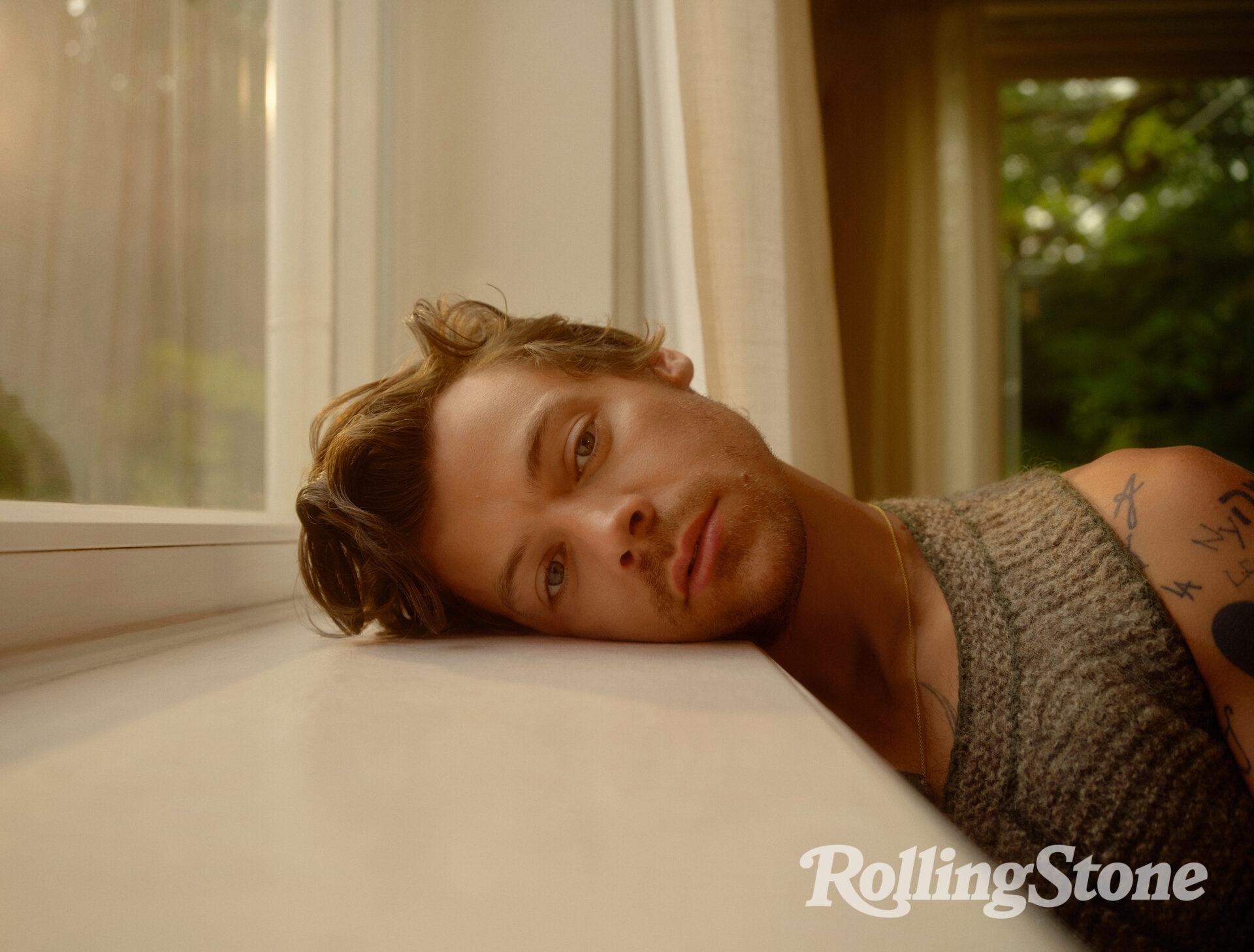
On a Friday night in New York, Harry Styles put on a show.
It wasn’t just any show; it was the first time he performed his third and soon-to-be-biggest album, Harry’s House, in its entirety. The crowd that May night covered Long Island’s UBS Arena in feathers and glitter and tears — a ritualistic skin shedding of sorts whenever Styles comes to town.
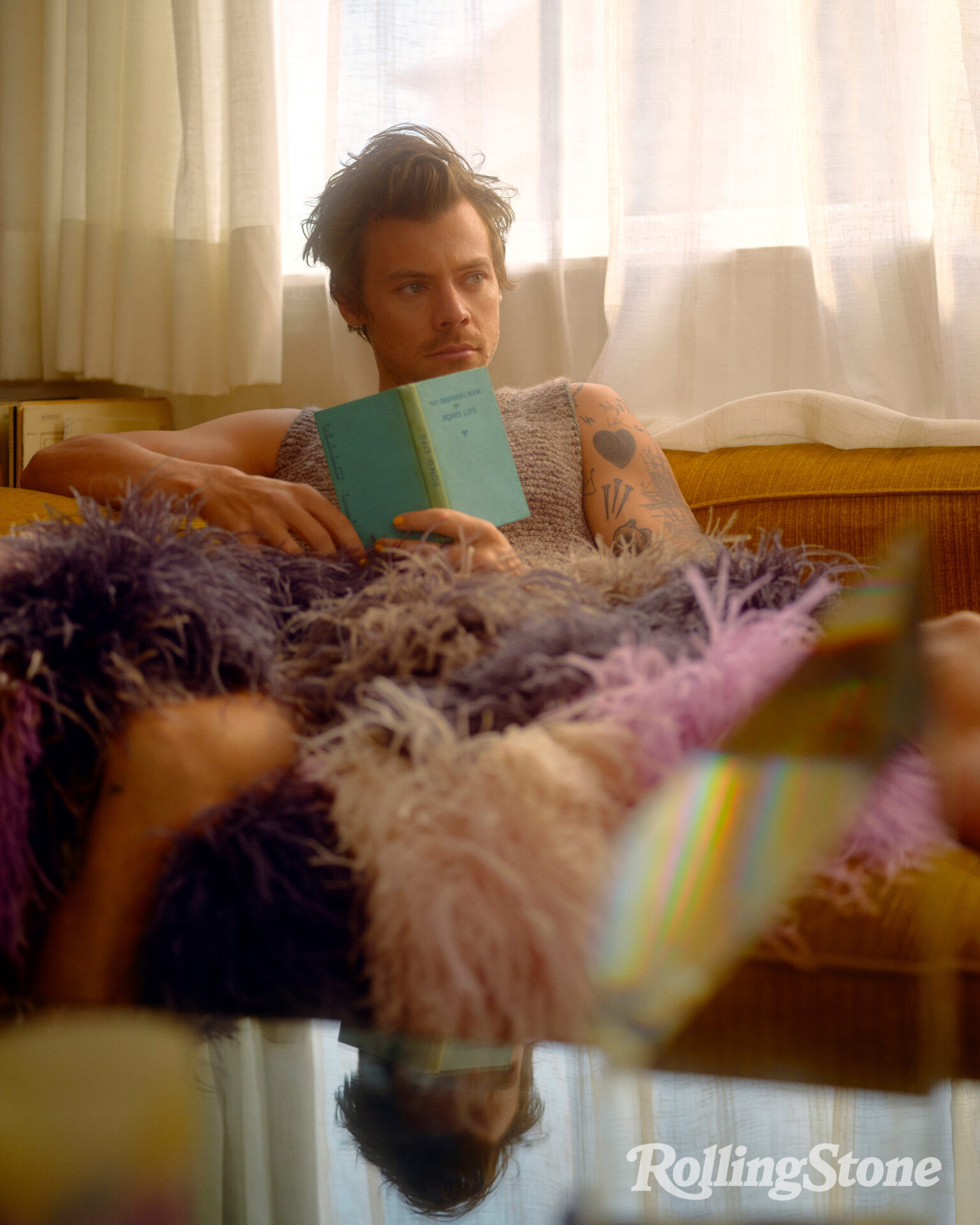

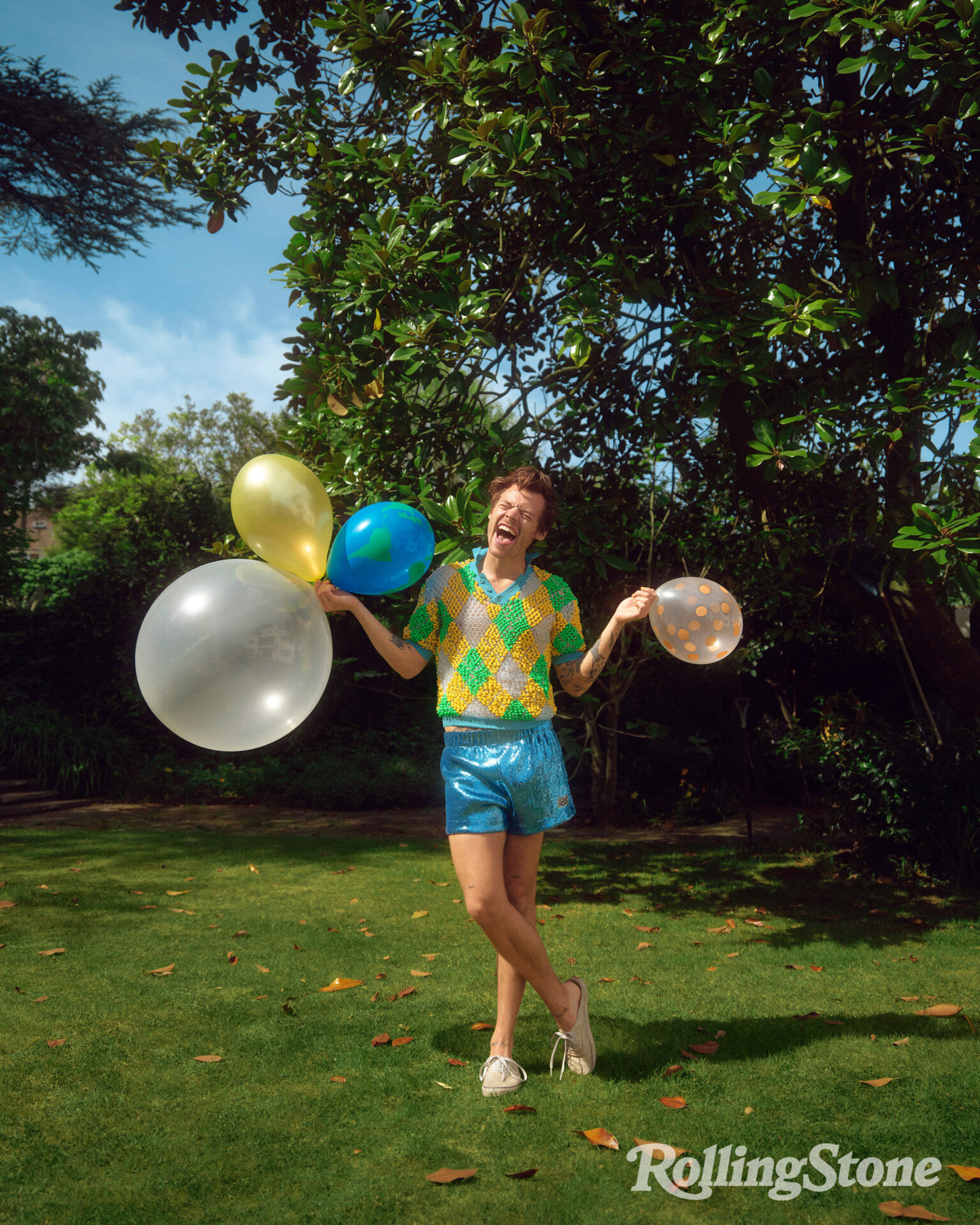
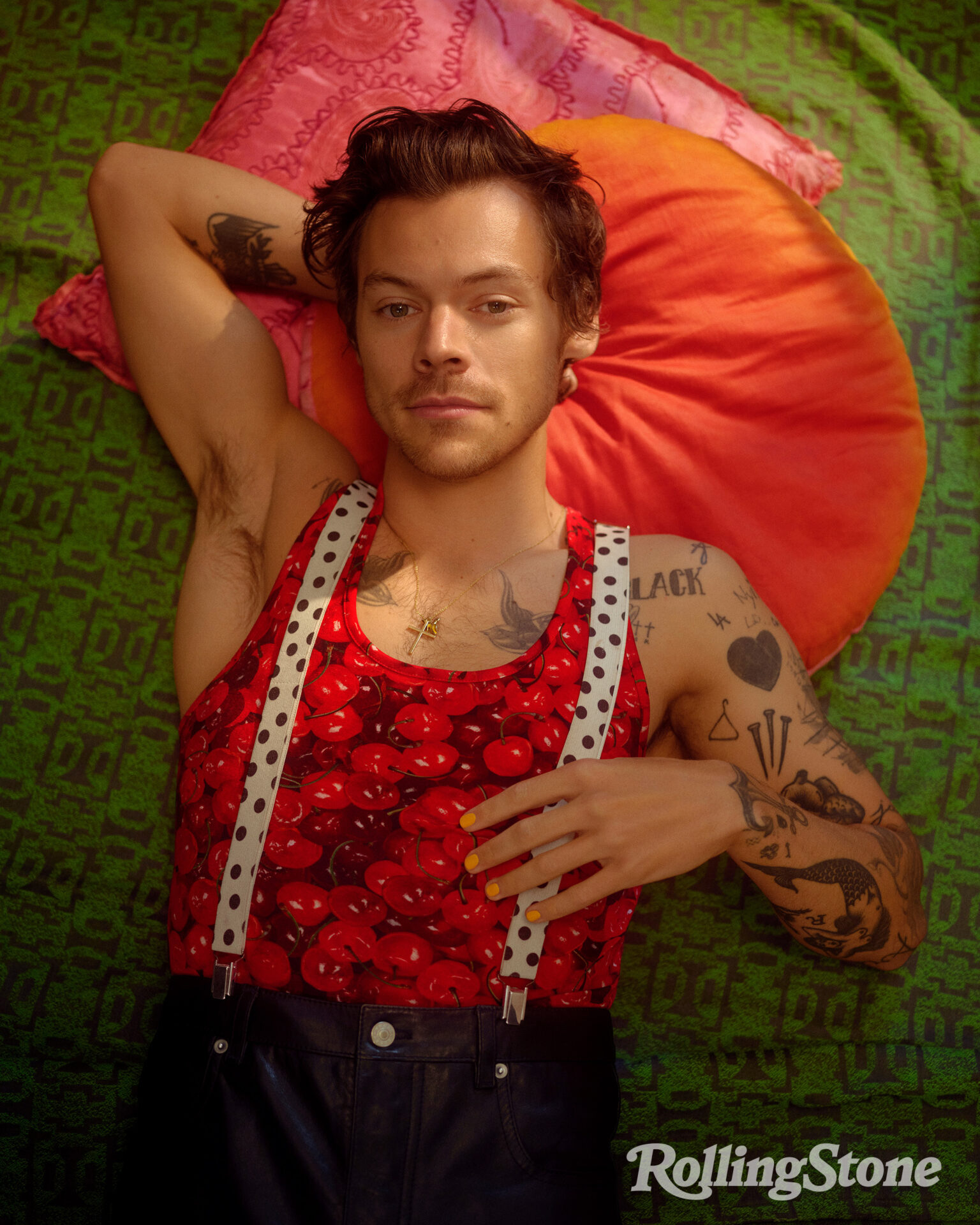
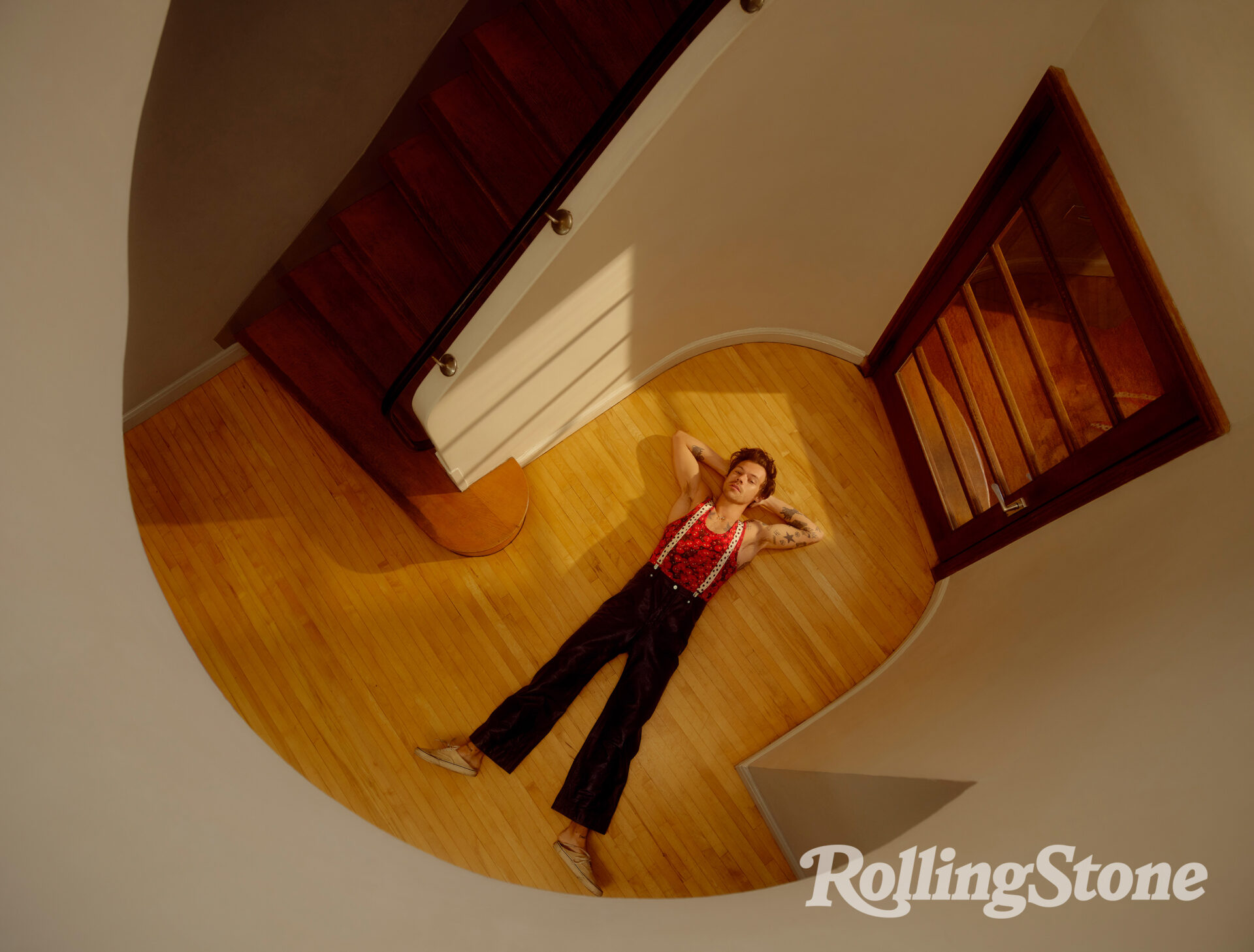
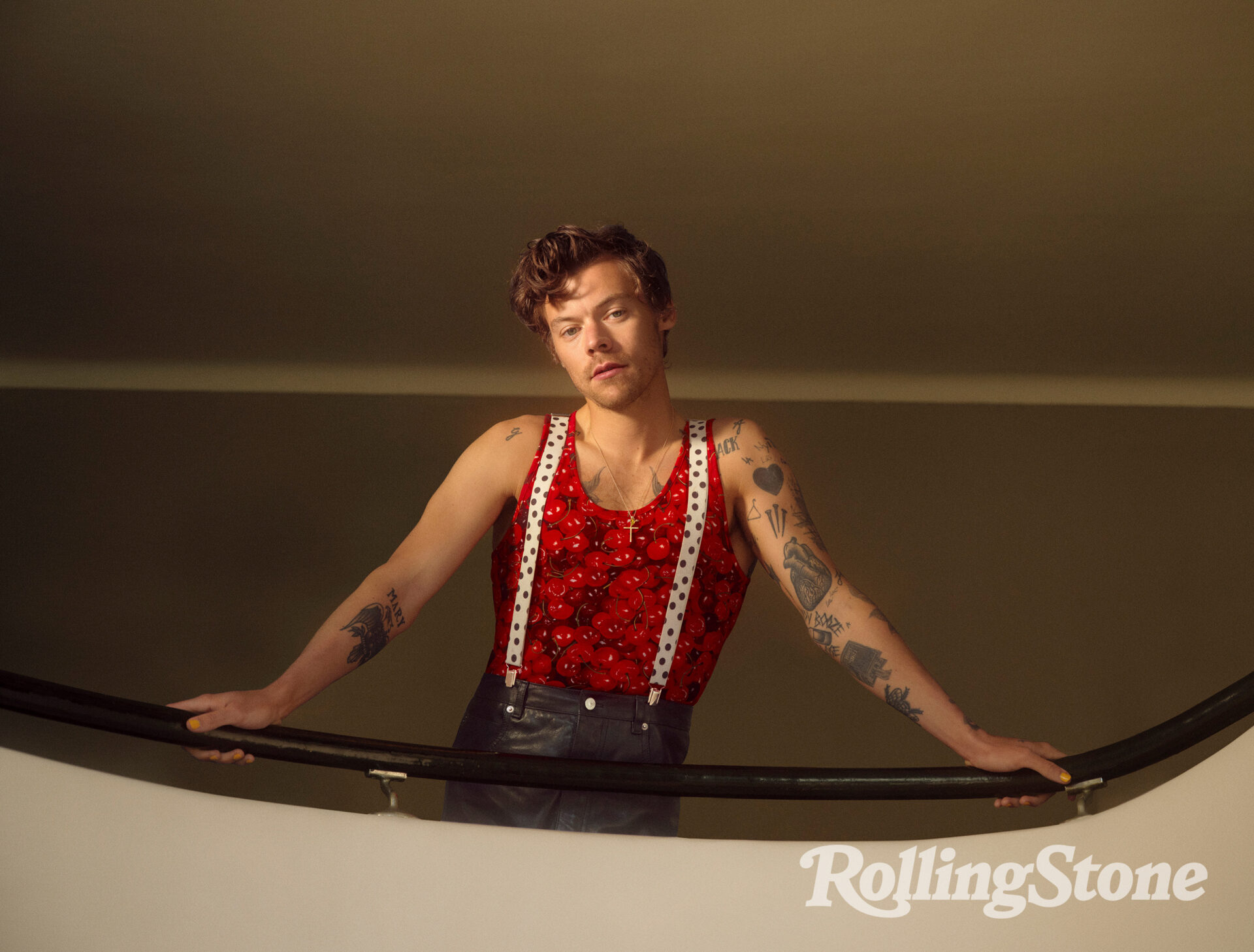
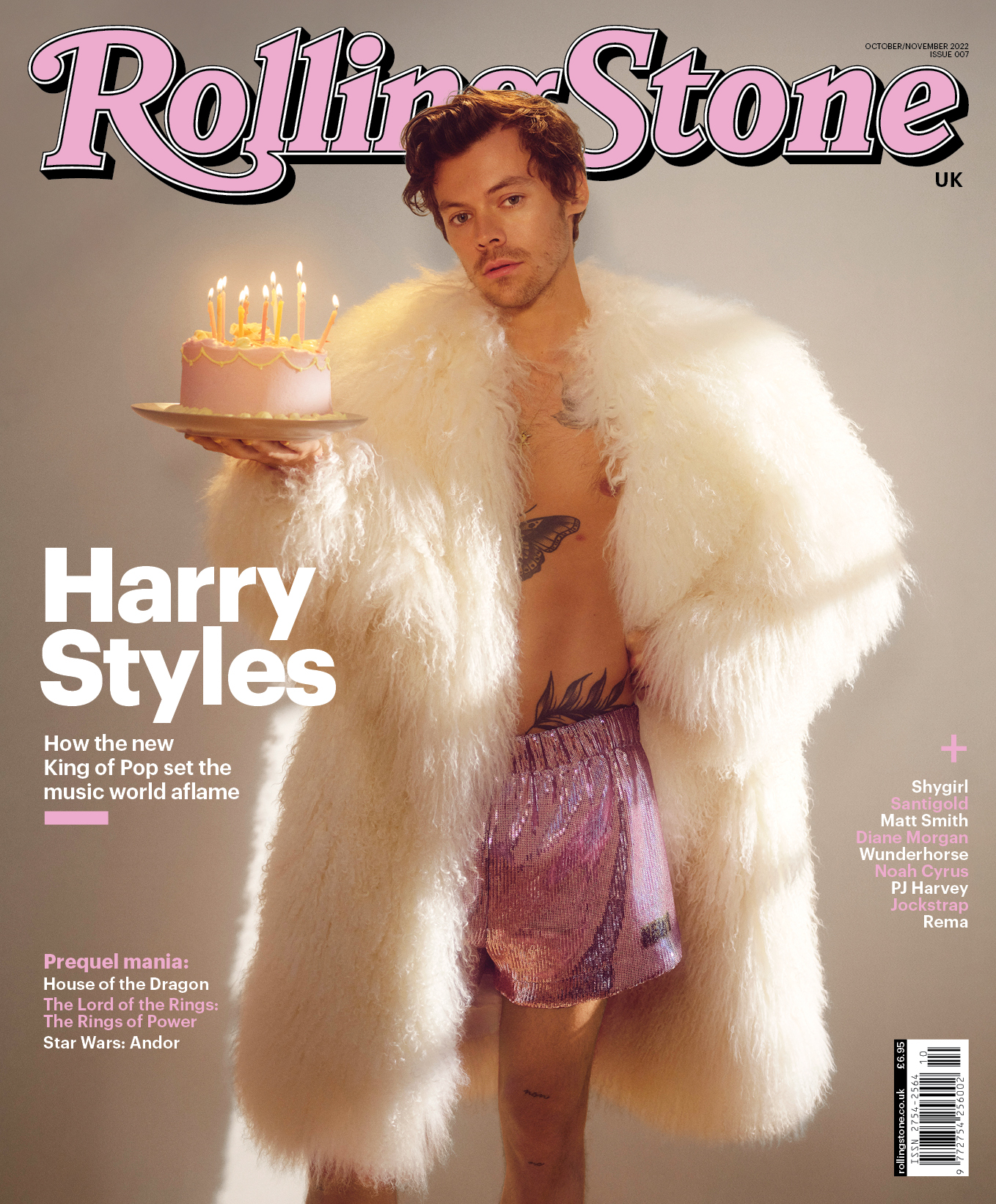
Fans noticed something different about the encore: Styles didn’t end with his usual closer, ‘Kiwi’; instead, he opted to finish the night with a second performance of his new single ‘As It Was’, his dance-through-the-tears pandemic reflection on isolation and change. When he played it, the crowd exploded in a way even Styles had never experienced. It left him a bit shaken.
“We came offstage, and I went into my dressing room and just wanted to sit by myself for a minute,” he tells me, two months later. “After One Direction, I didn’t expect to ever experience anything new. I kind of felt like, ‘All right, I’ve seen how crazy it can get.’ And I think there was something about it where I was… not terrified, but I just needed a minute. Because I wasn’t sure what it was. Just that the energy felt insane.”
At 28, Styles has unlocked a new level of stardom for himself. Years ago, he regularly filled stadiums as a member of One Direction, his former boy band. This spring and summer, he’s playing them on his own. ‘As It Was’ has become his hugest song yet, setting streaming records and topping the charts in more than two dozen countries, including 10 weeks straight in the US. Because he’s a star with a largely young, female fan base, many have refused to engage with him as much more than a pretty teen idol. (I don’t need to lay out decades of music history to show how wrong of a take that is.) But he can feel the tides change in curious ways. “‘As It Was’ is definitely the highest volume of men that I would get stopping me to say something about it,” he notes. “That feels like a weird comment because it’s not like men was the goal. It’s just something I noticed.”
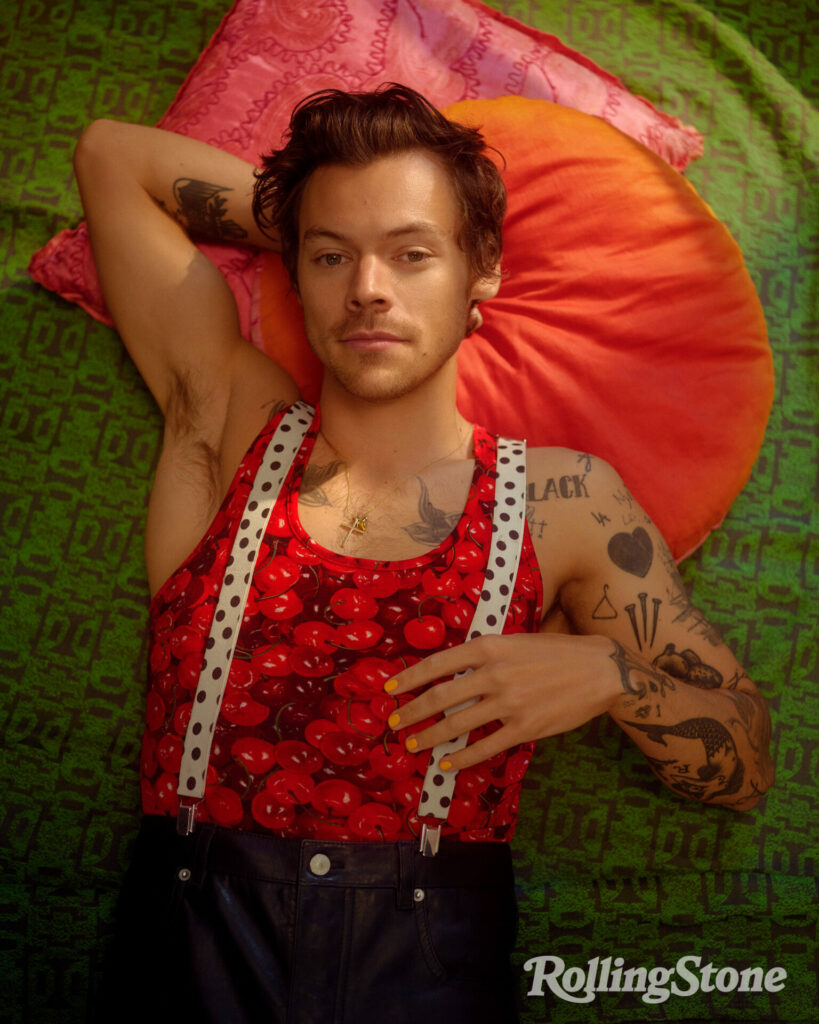
Before his headlining set at Coachella in April, I caught Harry backstage, surrounded by James Corden, Styles’s onstage guest Shania Twain, and his girlfriend, Olivia Wilde. Later, I took in sold-out shows in New York and at Wembley Stadium. The immense love showering Styles was impossible to ignore — you see it in the faces of every fan, whether they’ve been supporting him for “one year, two years, five years, 12 years”, as he says in nearly every end-of-show thank you speech. Along the way I heard him everywhere, even when I wasn’t trying. ‘As It Was’ played in every cab. ‘Watermelon Sugar’ soundtracked breakfast. ‘Golden’ lurked quietly at a London chemist’s. ‘Late Night Talking’ blasted at a Brooklyn bar, leading one man to proclaim, “I like Harry Styles. I can admit it,” like it was a radical act of self-acceptance.
And while he may be everywhere in 2022, Styles is, at the moment, literally right in front of me, sitting in an armchair of a hotel business suite in Hamburg, Germany, on a sweaty June afternoon. After a dip in the Irish Sea this morning, he flew into town and is now enjoying a day off in the middle of his first European tour since 2018.
In person, Styles looks more like your best friend’s cute, sporty older brother than the gender-bending style icon he’s become. He’s left the boas and sequin jumpsuits in the dressing room, opting instead for a blue Adidas track jacket, gym shorts, and Gucci trainers. His hair, often described as “tousled”, like he’s a renegade prince in a romance novel, is clipped back with a hair claw, a signature day-off accessory.
Styles is a kind of millennial anomaly: he plugs his phone in across the room, never once sneaking a glance for a rogue notification. He maintains eye contact as his thoughts unfurl in his often slow drawl. He’s a bit more Zen, even stoic, than he once was; that goofy, class-clown energy he exuded when the world first fell in love with him in One Direction 12 years ago has naturally diminished. But he’s still as affable and charming as ever, remembering details from small talk we had in all the other cities where I had been (professionally) stalking him, and proving earnestly curious about how I was going to spend my time in Hamburg and how magazine deadlines work. (Back in New York, after surprising fans at a Spotify event for his new album, he asked me my thoughts on David Crosby’s most recent album, which he loved.)
“‘As It Was’ is definitely the highest volume of men that I would get stopping me to say something about it”
— Harry Styles
“My great uncle lives here,” Styles says of Hamburg. “He married a German lady, so I have a German cousin. They always used to come and visit when I was a kid, and the only word in English [the cousin] knew was ‘lemonade’. I didn’t know if she actually wanted lemonade or was trying to say ‘Give me some water, please!’”
Of course it wasn’t meant to take him this long to get back to places like Hamburg, where he’ll play for more than 50,000 fans tomorrow night at Volksparkstadion, a local football stadium. Love on Tour, the name for his current trek, was supposed to launch in the spring of 2020, a few months after Styles released his second album, Fine Line. We all know what happened next.
Styles didn’t get to play live again until last autumn, but something funny happened in the interim. While we were bound to our homes, Styles experienced his first number one hit in Fine Line’s ‘Watermelon Sugar’, a tune so sweet it may take a moment to realise he’s singing about cunnilingus. Less than a year later, he won his first Grammy for it.
As the pandemic deepened, Styles ended up back in Los Angeles, where he keeps a home, and moved in with three friends. They’d “go for walks, cook dinner, wash the lettuce, all that kind of stuff,” he says, until he decided to use his downtime productively and began writing new material. Rick Rubin’s Malibu studio, Shangri-La, was available, so Styles moved in with longtime producers and co-writers Kid Harpoon and Tyler Johnson. “We didn’t really know what we were going in for,” he says. “It just felt like sitting at home doing nothing might feel better if we all move in together and try to make some music.” Before they knew it, they were making Harry’s House, a revelatory statement that happens to be his most radio-friendly album to date. He took inspiration from Haruomi Hosono’s 1973 LP, Hosono House, which he first heard when he lived in Japan years ago, and treated the songs like they were an internal monologue, traversing a day in his life.
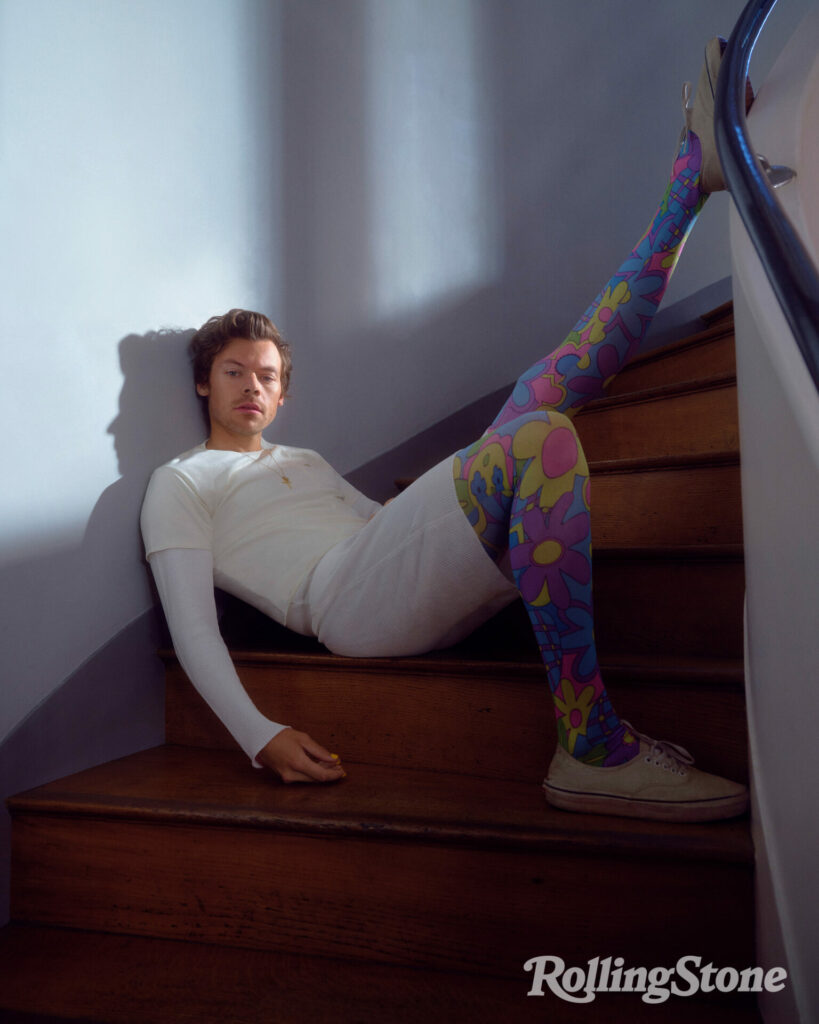
When flying became an option, Styles came home to London. Later, he drove down to Italy in his late stepdad’s car with a friend, listening to the jazz CDs left behind. He visited the Trevi Fountain one day, likely wearing his short-lived pandemic moustache, and was greeted with just four other people instead of the usual throngs that surround the historic site: “I felt like every day you’d say, ‘Weird time, isn’t it?’ Then go, ‘Yeah, it’s fucking insane!’”
He credits his stream of roommates — friends, collaborators — with keeping him together during this time. “I really would’ve struggled if I’d done the whole thing by myself,” he says, mirroring the “Harry, you’re no good alone” lyric from ‘As It Was’. After Italy, Styles visited friends in France, then returned to work, eventually posting up at Real World Studios near Bath. By the time he set off across the US to finally tour behind Fine Line last autumn, Harry’s House was secretly finished.
Now, besides the unavoidable singles and the victory-lap world tour, there are other indicators of next-level stardom: his skincare, nail polish and clothing line called Pleasing and a fashion collection with Gucci, not to mention his flourishing movie career. He’s starring in the psychological thriller Don’t Worry Darling and in the intimate drama My Policeman, and he’s nabbed a deal with Marvel Studios to play Eros in at least one of the Eternals films. “Everything in my life has felt like a bonus since X-Factor,” he says, referring to the singing competition that led directly to One Direction. “Get on TV and sing. I never expected and never thought that would happen.”
But today, in a Hamburg hotel, Styles is still trying to make sense of it all. He thinks hard about love, shame, honesty and the importance of kindness and therapy. And he worries. He worries about how he can be one of the biggest pop stars in the world, the kind who can be everything for his fans while also being a great son, brother, friend and partner to the people standing beside him. As everything gets bigger, Styles imagines a life that is smaller. How does the world’s most wanted man save the best parts for himself?
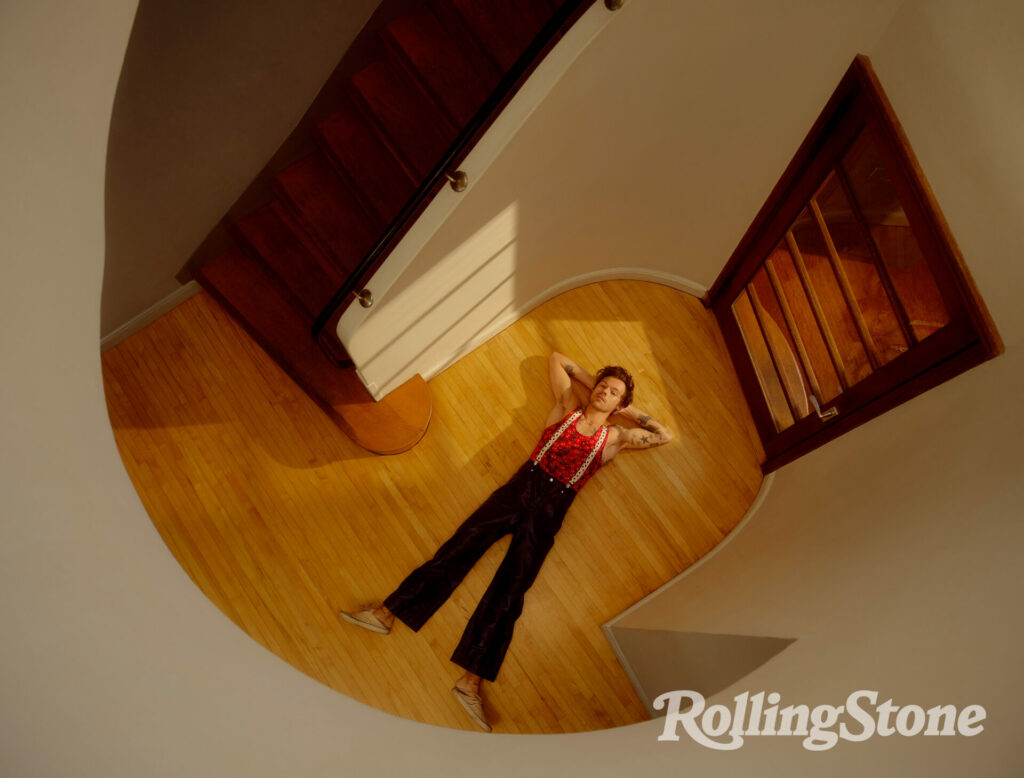
When Styles played two sold-out shows at Wembley Stadium in June, the first thing he did after stepping offstage each night was take a shower. The post-show shower has become a ritual: a hygienic necessity, sure, but also a crucial moment of clarity and reflection. He washes away the screams full of love and desire to just be in his presence. Anyone would be overwhelmed by that. “It’s really unnatural to stand in front of that many people and have that experience,” he says. “Washing it off, you’re just a naked person, in your most vulnerable, human form. Just like a naked baby, basically.”
Those post-Wembley showers were especially gratifying. When One Direction, which Styles casually refers to as “the band”, played the stadium in 2014, he ended up with tonsillitis on the day of the show. “I was miserable,” he recalls. “We played the first one, and I remember I came off, got in the car, and just started crying because I was so disappointed.”
Styles’s solo shows at Wembley were a reunion of sorts: he had friends and family from all parts of his life and career in the audience on both nights. His mum, Anne Twist, sister Gemma, friends and his team all danced in the stands next to Wilde and her two young children. Even former bandmate Niall Horan swung by, smiling through ‘What Makes You Beautiful’.
As he’s become one of the world’s biggest pop stars, Styles’s need for privacy — for keeping that “naked baby” self out of the public eye — seems to have grown. Secrecy has helped to fend off constant questions about his sex life, the kind that were tossed his way as soon as he was of legal age.
“Everything in my life has felt like a bonus since X-Factor. Get on TV and sing. I never expected and never thought that would happen”
— Harry Styles
In the past couple of years, he started to go to therapy more routinely. “I committed to doing it once a week,” he explains. “I felt like I exercise every day and take care of my body, so why wouldn’t I do that with my mind?”
Through it, he started to process parts of himself he hadn’t figured out before. “So many of your emotions are so foreign before you start analysing them properly. I like to really lean into [an emotion] and look at it in the face. Not like, ‘I don’t want to feel like this,’ but more like, ‘What is it that makes me feel this way?’”
One feeling he needed to shed was shame, the kind of shame that comes from having your sex life scrutinised while you’re still just trying to make sense of it. Over the years, he learned to stop apologising for it. He learned he could be vulnerable in private while still protecting it from the public.
Sometimes, though, he worried he was a “hypocrite” for being so closed off. His shows have become empowering safe spaces for his fans, so many of whom want to share who they are with him. Onstage, he’s helped people come out to their parents and facilitated everything from marriage proposals to gender reveals. Separating his personal life from his public one hasn’t been a choice he takes lightly. “When I’m working, I work really hard, and I think I’m really professional,” he says. “Then when I’m not, I’m not. I’d like to think I’m open, and probably quite stubborn, too, and willing to be vulnerable. I can be selfish sometimes, but I’d like to think that I’m a caring person.”
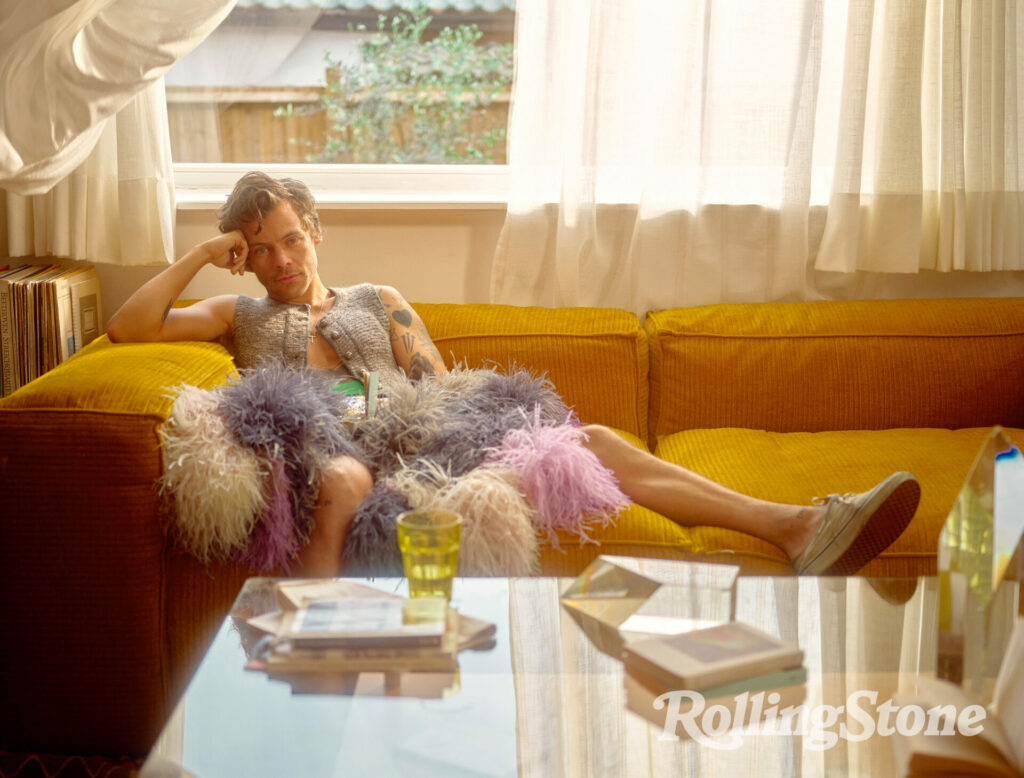
He’s found a vague balance through compartmentalisation. “I’ve never talked about my life away from work publicly and found that it’s benefited me positively,” he explains, perhaps preemptively. “There’s always going to be a version of a narrative, and I think I just decided I wasn’t going to spend the time trying to correct it or redirect it in some way.”
Drawing the curtain over his life has only made everyone who’s not behind it more curious. His sexuality, for example, has been a topic of near obsession for years. He has embraced gender fluidity in his fashion, like Mick Jagger and David Bowie before him, and has repeatedly pointed out how backward it feels to require labels and boxes for everyone’s identity. Critics of his approach have accused him of “queerbaiting” or profiting off queer aesthetics without explicitly claiming the community. Defenders feel it’s unfair to force anyone to label themselves as one thing in order to validate their gender or creative expression.
Styles, without prompting, points out how silly he finds some of the arguments about how he may identify to be: “Sometimes people say, ‘You’ve only publicly been with women,’ and I don’t think I’ve publicly been with anyone. If someone takes a picture of you with someone, it doesn’t mean you’re choosing to have a public relationship or something.”
Of late, this can be contested. While he is everywhere, so is Olivia Wilde. The pair met on the set of Don’t Worry Darling, which she directed (more on that in a moment), then made a splash when paparazzi snapped them holding hands at his manager and close friend Jeffrey Azoff’s wedding in January 2021.
Wilde and Styles have said little about the relationship, and rumours have filled the space. Anonymous tweeters acted appalled at their age difference (as if a 28-year-old man dating a 38-year-old woman isn’t completely normal) and criticised the director-actor dating dynamic (as if there isn’t a long history of beloved Hollywood couples meeting the same way).
More intense and jarring was a corner of Styles’s fandom that has made fun of Wilde’s dancing or made lengthy Twitter threads and TikTok videos cancelling her for bad or insensitive jokes made a decade ago. If Styles is already held up to a high standard, his potential partners are held to an unreachable one for some of his fans.
Styles is not the most online person — he uses Instagram to look at plants and architecture posts, has never had the TikTok app, and calls Twitter “a shitstorm of people trying to be awful to people” — but he’s still aware of how those small, toxic corners of the internet are treating the people closest to him. “That obviously doesn’t make me feel good,” he says, carefully. It’s a tightrope he’s treading in discussing this. He wants to — and does! — see the good in his fans, but there’s no denying that like every large online community, this one has a faction that runs on hate and anonymity.
Even with the boundaries he’s set between his public and private lives, sometimes “other people blur the lines for you”, he says. There’s a conversation he has to have early in a relationship, no matter how weird or premature it may feel. “Can you imagine,” he says, “going on a second date with someone and being like, ‘OK, there’s this corner of the thing, and they’re going to say this, and it’s going to be really crazy, and they’re going to be really mean, and it’s not real…. But anyway, what do you want to eat?’”
“Everyone, including myself, has your own journey with figuring out sexuality and getting more comfortable with it”
— Harry Styles
While Styles takes comfort in knowing his whole fandom is not like that, he still wonders about how to respond when the noise gets too loud. “It’s obviously a difficult feeling to feel like being close to me means you’re at the ransom of a corner of Twitter or something,” he says. “I just wanted to sing. I didn’t want to get into it if I was going to hurt people like that.”
When asked about her experience with his fans, Wilde is diplomatic. Like Styles, she believes in what they stand for as a collective, calling them “deeply loving people” who have fostered an accepting community. “What I don’t understand about the cruelty you’re referencing is that that kind of toxic negativity is the antithesis of Harry, and everything he puts out there,” she tells me. “I don’t personally believe the hateful energy defines his fan base at all. The majority of them are true champions of kindness.”
Styles became a leading man when he was four years old, starring in a play called Barney the Church Man. Later, he transformed into Buzz Lightyear in a production of Chitty Chitty Bang Bang “because Buzz Lightyear was in the toy shop for some reason”. His other early theatre credits include: Razamatazz in Bugsy Malone (“the band leader”) and the Elvis-inspired Pharaoh in Joseph and the Amazing Technicolor Dreamcoat. (He would later audition for Baz Luhrmann’s Elvis, but was deemed too iconic by the director.)
Other than that, acting wasn’t really part of his life plan. He liked it, but he found a new rush when he started performing with his band White Eskimo. When they debuted at — and won — a Battle of the Bands competition, it was the first time he felt “the switch”: his teachers looking up at him, instead of vice versa. “I think I was just a show-off,” he says, with a hint of cheekiness. “I say that like it’s past tense.”
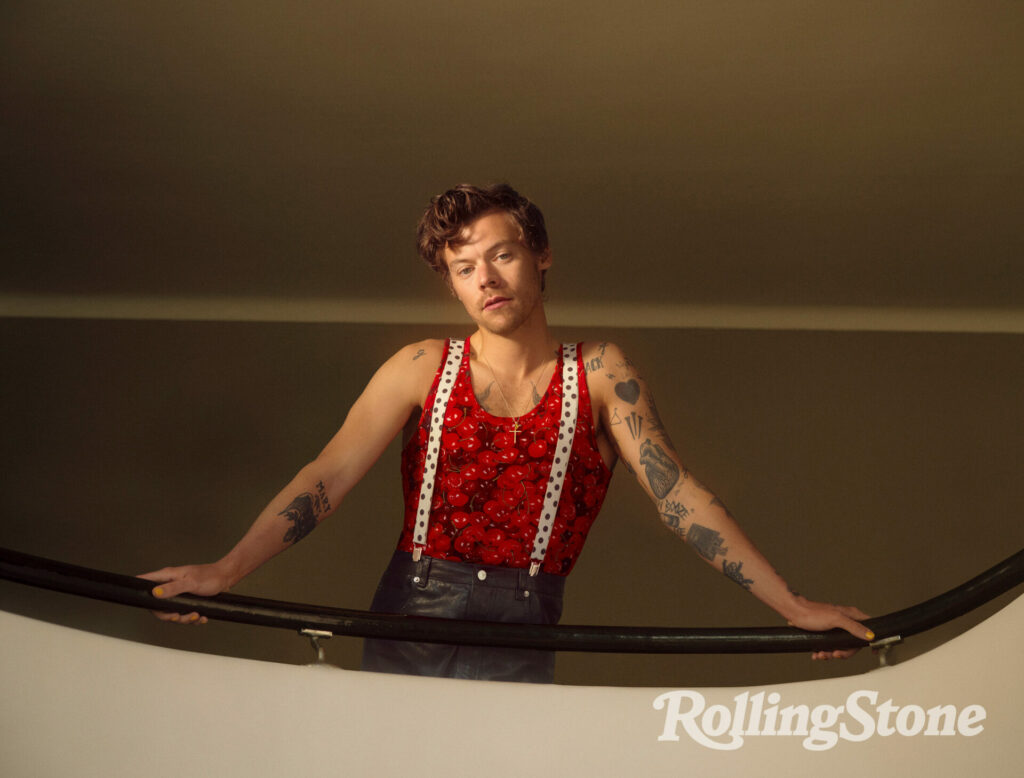
But as Styles was preparing the release of his solo debut in 2017, he took his first foray back into acting, with a supporting role in Christopher Nolan’s war epic, Dunkirk. (The director said he had no idea how famous Styles was when he cast him.) By the time Marvel recruited him to become Eros, director Chloé Zhao had no one else but Styles in mind for the role. Thanos’s more heroic brother is portrayed in the comics as an intergalactic playboy of sorts, with superhuman strength and the ability to control people’s emotions (a fitting role for the planet’s hottest pop star). MCU boss Kevin Feige recently teased more from Styles, though so far, his only appearance has been the Eternals’ post-credits scene, alongside the Patton Oswalt-voiced Pip. “It’d be funny if that was it, wouldn’t it?” he jokes of his cameo.
Styles’s role in Dunkirk grabbed Wilde’s attention as she was beginning to map out Don’t Worry Darling. He was an early contender for the role of Jack, a charming but secretive husband to Florence Pugh’s increasingly troubled Alice. And Styles had plenty of reasons to be interested in Don’t Worry Darling. Wilde’s second feature film as a director reportedly started a bidding war among 18 studios, following the success of her directorial debut, Booksmart.
Pre-pandemic talks between Styles and the Darling team didn’t make it far; he was, after all, due on a global tour for most of 2020. Instead, Shia LaBeouf won the role, but by the end of that summer, Wilde had reportedly booted the actor for poor on-set behaviour.
“I’d wanted to act again,” Styles says. He spent a lot of the pandemic watching movies with his quarantine set of friends and collaborators: he rescreened favourites like the 2012 Belgian drama The Broken Circle Breakdown. Some nights, he and his friends would put a bunch of titles in a hat and choose. (“There was a couple different tastes in the house, so it was between, like, Parasite and Coyote Ugly.”)
Styles was announced as LaBeouf’s replacement a month before filming began. He proved perfect for the role of Jack, who’s brought Alice to the remote, fictional American town of Victory to work on a secret project the men at the company won’t tell their wives about. Jack’s become a star employee and is desperate for his boss’s approval. “We were looking for someone with innate warmth and palpable charm,” Wilde says. “The entire story depended on the audience believing in Jack.”
Styles shot Don’t Worry Darling between September 2020 and February 2021 in LA and Palm Springs. Those months were the longest Styles had lived in one place in 11 years. He thought about going completely off the grid while making it: maybe get a flip phone, stop making music. “The reality is you get there on the first day and wait around for 75 per cent of it,” he says. “And it’s like, ‘Actually, I’m going to text my mate.’”
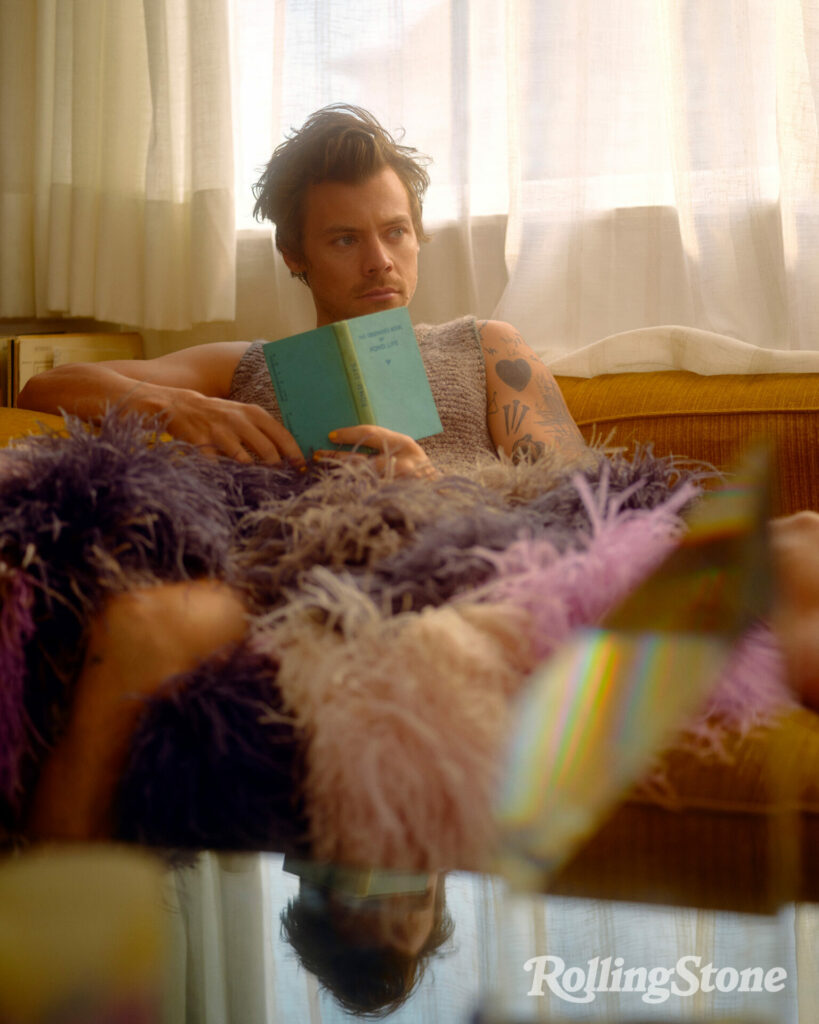
At the start, he was understandably anxious about taking on such a large role alongside stars like Pugh, Chris Pine, Gemma Chan and Nick Kroll. “In music, there’s such an immediate response to what you do. You finish a song and people clap,” he says. “When you’re filming and they say ‘Cut,’ there’s maybe part of you that expects everyone to start clapping, [but] they don’t. Everyone, obviously, goes back to doing their jobs, and you’re like, ‘Oh, shit, was it that bad?’” (Being an actor reminded him of session musicians: “You get called in to do your bit, and then someone else puts it all together and makes it.”)
The risk may pay off: he and Pugh are already getting awards season buzz. Wilde says one moment “left us all in tears” — Jack’s promotion scene during a big company gala. “It’s a strange scene, full of fascist references, and a disturbing amount of male rage,” Wilde says. “The scene called for him to stand onstage with Frank (Chris Pine) and chant their creepy slogan, ‘Whose world is it? Ours!’ over and over again. Dark as hell. But Harry took it to another level. He was so fully in the moment, he began screaming the lines to the crowd, in this primal roar, that was way more intense than anything we expected from the scene.”
According to Wilde, Pine backed away, understanding this was Harry’s moment. “The camera operator followed him as he paced around the stage like a kind of wild animal,” Wilde remembers. “We were all gobsmacked at the monitor. I think even Harry was surprised by it. Those are the best moments for an actor — when you’re completely outside your body.”
Within weeks, Styles went from the set of Darling to shooting the more intimate My Policeman. He had read the script the year prior, moved by the story enough to have contacted director Michael Grandage and request a meeting. Styles showed up with every line memorised.
Styles plays Tom, a policeman who develops feelings for a museum curator named Patrick (David Dawson). Set in the 50s, when it was still illegal to be in a same-sex relationship in the UK, the pair move in secret while Tom pursues a marriage with a schoolteacher named Marion (Emma Corrin). The film shifts between the past and the present, when the three reunite under dire circumstances. “It’s obviously pretty unfathomable now to think, ‘Oh, you couldn’t be gay. That was illegal,’” Styles says. “I think everyone, including myself, has your own journey with figuring out sexuality and getting more comfortable with it.” To him, My Policeman is a very human story. “It’s not like, ‘This is a gay story about these guys being gay.’ It’s about love and about wasted time to me.”
According to Styles, Grandage wanted to highlight what sex is really like between two men in the scenes between Tom and Patrick. “So much of gay sex in film is two guys going at it, and it kind of removes the tenderness from it,” Styles continues. “There will be, I would imagine, some people who watch it who were very much alive during this time when it was illegal to be gay, and [Michael] wanted to show that it’s tender and loving and sensitive.”
Darling and Policeman make their big premieres at prestigious film festivals in Venice and Toronto late this summer, but Styles isn’t sure his pivot to the silver screen will be permanent. “I don’t imagine I’d do a movie for a while,” he says. There are rumours about how many Marvel movies he’s signed on for and other franchises he might be secretly in talks to do. (In response to a rumour he’ll be starring in a future Star Wars series, he says, “That’s the first I’ve heard of that. I’d imagine… false.”)
He doesn’t rule out taking on new roles. “I think there’ll be a time again when I’ll crave it,” he says. “But when you’re making music, something’s happening. It feels really creative, and it feeds stuff. A large part of acting is the doing nothing, waiting thing. Which if that’s the worst part, then it’s a pretty good job. But I don’t find that section of it to be that fulfilling. I like doing it in the moment, but I don’t think I’ll do it a lot.”
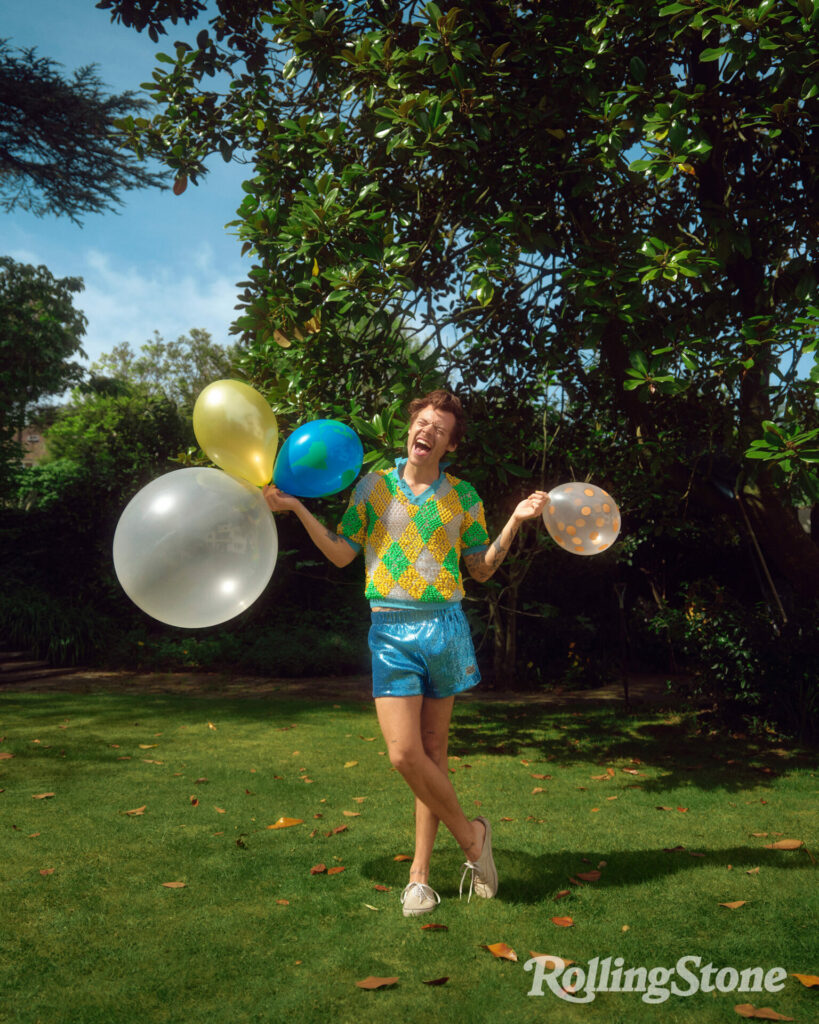
Like a true tousled-haired prince, Styles invites me to attend a concert with him by the philharmonic in Hamburg, eight hours before his own show.
On past tours, he says, “I was getting to a lot of cities and feeling like ‘I’ve been here six times and I’ve never seen any of it.’” This tour, he’s been taking in a lot of architecture. “It’s something I can do on my own, just sit somewhere and look at stuff,” he says.
Studying the finer points of buildings fits the regimented, disciplined and distinctly grown-up tour life he’s created. Styles has found himself enamoured with routine on the road: 10 hours of sleep a night, IV injections pumping him with nutrients and vitamins, a strict acid-reflux-conscious diet that cuts out coffee, alcohol and certain foods that affect the throat 50,000 fans are depending on. Last night, he slept with two humidifiers that apparently made it look like he was stepping out of a steam room when he opened his hotel room door.
The Elbphilharmonie Hamburg — “Elphi” for short — is a striking structure, looking something like a gorgeous sail. Styles is wearing the same outfit as when I met him in the hotel the day before, only with shorts swapped out for pinstripe pants and a surgical mask covering his face. He and I are both late and can’t be let into the show until intermission, so instead we comb through the backstage hallways and elevators to see rooms built for incredible acoustics and sweeping views of Hamburg. He marvels at all of it. In a temperature controlled room full of pianos, he asks our tour guide which is the best (“Is there a shining star?”) before sitting down at one and playing for a couple of dreamy, Beatlesque minutes. (He’d mentioned earlier that he spent last summer playing piano every day with his morning coffee.) He has questions about panelling. And like a true tourist, he takes pictures of everything.
The first time I ever met Styles was a lot like this. On his first headlining tour, in San Francisco in 2017, I went backstage to interview Kid Harpoon. Styles stumbled into the room where I was waiting, strolling around less like a headliner with fans lined up around the block and more like the lighting guy. Here was someone who is inexplicably difficult to casually enjoy (you watch one video of One Direction’s funniest interview moments on YouTube and suddenly you’re contemplating how many of their cardboard cutouts you can fit in your dorm) acting so casually. He greeted me then like an old friend, not someone who was still refusing to let go of a One Direction keychain at the time. He asked me how I had been, what I was up to in San Francisco, and if I was excited for the show. Of course I remember every second of it.
Styles has a gift for making those in his presence feel seen. Just ask fans who bump into him on walks through Central Park or Hampstead Heath, then detail those moments as if they had met the pope (granted, the pope could never pull off a hair claw).
Before the second half of the concert at the Elphi, the crowd mingles and grabs drinks. As we walk through, Styles goes unnoticed. (The mask helps.) It’s funny to watch one of the world’s biggest pop stars move through space with such ease, as if he’s blissfully unaware of how well-known he is.
“If you make your life about the fact that you can’t go anywhere and everything has to be a big deal, then that’s what your life becomes,” he says. “Now, in London, I walk everywhere. It’s hard to stumble across things and restaurants and places and stuff if you’re just driving everywhere, and it’s just not that fun.”
Styles outlines his upcoming months for me: in August, after he wraps his European tour in Lisbon, he’ll go on holiday with some friends, maybe catch up on the Love Island season he was “gutted” to miss, or see if The Bear is as good as everyone tells him it is. The next leg of his tour includes stops in LA, New York, Austin and Chicago as extended residencies, a decision that meets his personal need for a less strenuous touring schedule and a professional need to be able to attend film festivals and rent studios to write and record music for his fourth album. “I’m always writing,” he says. He and his collaborators are already throwing around ideas. “I think all of us are so excited to get back to it, which feels insane because we’ve just put an album out.”
“What I value the most from my friends is I’m reminded that it’s OK to be flawed. I’m pretty messy and make mistakes sometimes”
— Harry Styles
More than ever, he is thinking about the future. He wants to take meaningful time off at some point — from touring at least, he’s always writing — and ensure he’s a more present figure for his family and friends. In turn, he’s learned to define what real love looks like to him. “The fantasy, or the vision, or the version of you that people can build you up to be feels like a person that isn’t flawed,” he explains. “What I value the most from my friends is I feel like I’m constantly reminded that it’s OK to be flawed. I think I’m pretty messy and make mistakes sometimes. I think that’s the most loving thing: you can see someone’s imperfections, and it’s not [that you] love them in spite of that, but it’s [that you] love them with that.”
He’s thinking about what it would be like if he had children one day: “Well, if I have kids at some point, I will encourage them to be themselves and be vulnerable and share.”
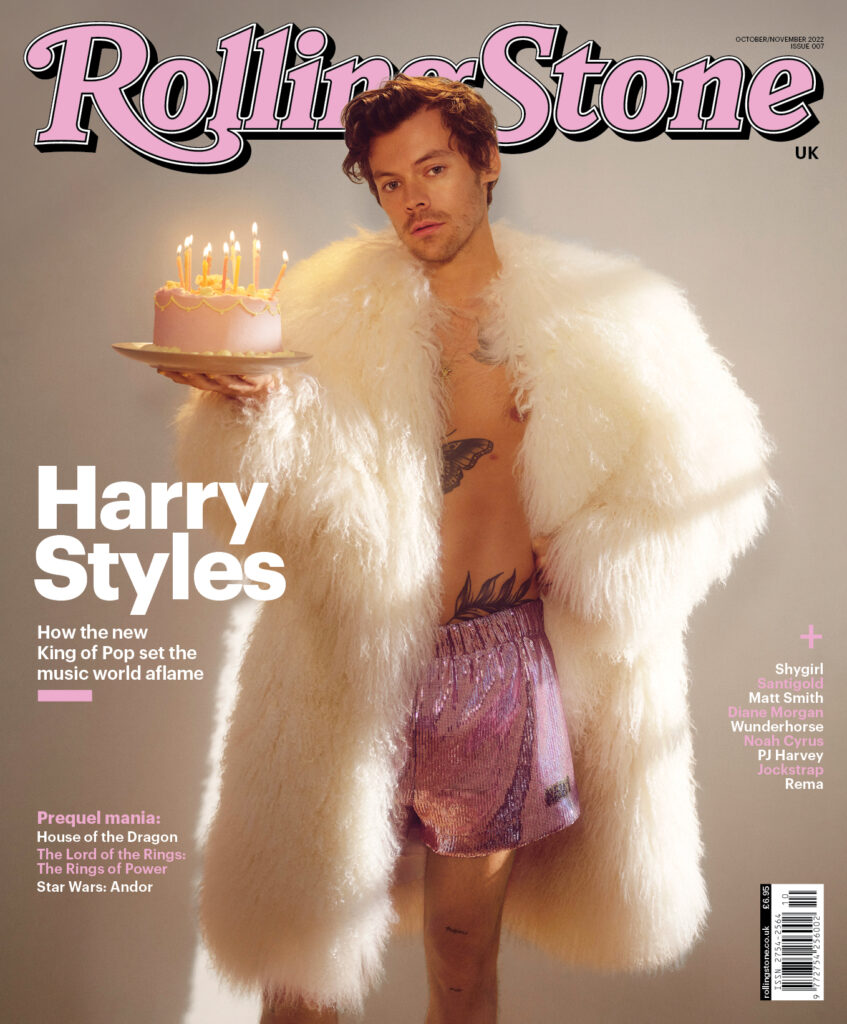
He’s thinking about what he wants to say, too. Styles admits he was uninterested in politics as a teenager, oblivious to things that didn’t personally affect him. But as he grew more famous, he worried about that, too. “I took a massive look at myself,” he says, “and was like, ‘Oh, I don’t do enough… or anything.” When conversations around anti-Blackness and inaction reached a fever pitch in 2020, Styles marched in the streets and read books like How to Be an Antiracist, by Ibram X. Kendi, and The Will to Change, by bell hooks. He started thinking about racial and gender equity, especially as someone who employs many people on the road. “Pretending as a white person you don’t get a head start just isn’t true,” he says.
We were hanging out right after Roe v. Wade had been overturned in America. “I can’t begin to imagine how terrifying it is to be a woman in America at the moment,” he says. He’ll grab a fan’s sign that reads “My Body, My Choice” at the Hamburg show, displaying it proudly onstage. There’s an energy in the crowds that fills him with careful optimism. “I feel lucky to see a group of people, even just on this tour, who come together in a way,” he says. “I think that group of people is so much less afraid of opening the wound, talking about it, and doing the work, than the generation before us.”
As we wait for the philharmonic’s packed show to restart, I notice a few young girls with their families in the audience and ask Styles what he thinks the crossover between this crowd and his show tonight will be. He looks around at the mostly older faces and goes, “Less than one per cent… I know I’ll be at both.”
Styles watches the orchestra studiously. When the conductor leaves and then returns to a standing ovation, Styles whispers, “He’s about to play his big hit.” Even when he’s not peacocking in front of 50,000, he’s still trying to entertain the one person he’s with.
We walk out before the crowd fully disperses. Styles lingers a second to take some photos of the room before he heads out to get ready for his concert, where he’ll bounce around the stage, lifted by the wails of young fans who have been waiting years for this moment.
His fans will linger tonight, too, crowding in the hundreds outside Volksparkstadion. They’ll take photos of their outfits, their tear- and sweat-stained glittery faces, the piles of abandoned boa feathers. They’ll play his big hits back to him, holding a phone light vigil as they sing One Direction’s ‘Night Changes’ or the Fine Line ballad ‘Falling’. As the city echoes as much of him as it can take, he’ll probably be washing it all away.
Taken from the October/November 2022 issue of Rolling Stone UK. Buy it online now. Available on UK newsstands from 24 August.
